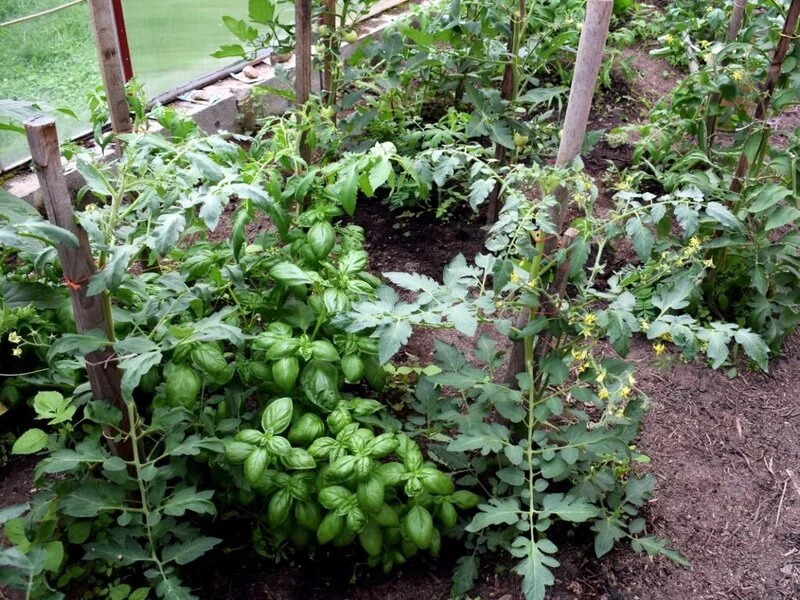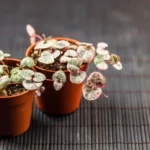Step into any herb garden, and you’ll likely find basil, with its bold aroma and distinctive flavor, holding a place of honor. Loved by cooks and gardeners alike, this popular herb is a superstar in its own right. But did you know that when basil shares its stage with certain other plants, a kind of garden magic can happen? This is the magic of companion planting, a centuries-old method that can enhance growth, deter pests, and even improve flavor. So, what should you plant with basil? Let’s find out together!
- Easy to grow
- Flat, green leaves are easy to chop
- Garden use: Containers, flower & herb beds
- Culinary use: Garnish, seasoning, salads, palate cleanser
- Plant in full sun to partial shade for the best yields
The Benefits of Planting Basil with Other Plants
So why consider planting basil with other plants? Well, it’s like pairing a fine wine with the perfect cheese – both are great alone, but together, they can be even better! Here’s how:
First off, basil is known to repel some common garden pests like mosquitoes and aphids. This makes it a great bodyguard for more vulnerable plants, protecting them from these unwanted invaders.
Secondly, some plants and herbs may actually grow better when planted with basil. Their growth can be enhanced, leading to more vigorous and healthy plants.
Last but not least, basil’s strong aroma can enhance the flavor of certain vegetables, particularly tomatoes. This means not only a more productive garden but a tastier harvest as well!
As you can see, when it comes to basil, there’s more than meets the eye. This humble herb can play a starring role in your garden’s success story. So, let’s delve deeper and discover which plants make the best companions for basil.
Best Companion Plants for Basil
If basil were to have a best friend, it would undoubtedly be the tomato. These two plants complement each other perfectly. Not only does basil help to repel pests that often plague tomatoes, but it’s also believed to enhance the flavor of these juicy red fruits. Talk about a dynamic duo!
But tomatoes aren’t the only plants that can benefit from basil’s companionship. Other vegetables like peppers and asparagus also appreciate having basil as a neighbor. The strong scent of basil can deter pests that frequently bother these plants.
In the herb family, basil gets along well with parsley and oregano. Their requirements for sunlight and water are quite similar, making them a perfect match in the garden. Plus, think about how convenient it will be to have these commonly used herbs growing side by side!
- Early fruiting variety produces large harvests even in cool weather
- Indeterminate, grows tall and produces throughout season
- Disease resistant
- Perfect for slicing, fresh eating and cooking
- Bonnie Plants has over 70 greenhouses across the country, so our plants don’t have to travel far to get to you
What Not to Plant with Basil
While basil makes a great companion to many plants, there are some it doesn’t pair well with. In particular, you’ll want to avoid planting basil near rue or sage. These herbs don’t appreciate the same sunny and moist conditions that basil loves, and they could suffer if planted too close together.
Another plant to keep away from basil is cucumbers. It’s believed that the strong aroma of basil might negatively affect the flavor of the cucumbers.
Remember, a happy garden is all about balance. By knowing which plants make good companions for basil and which don’t, you can create a garden where all your plants can thrive.
Tips for Successful Companion Planting with Basil
Now that you know the best and worst companions for basil, here are some handy tips to make the most of your companion planting adventure:
- Spacing is Key: Even the best of friends need a bit of space. Make sure you provide enough room between your basil and its companions for both to grow without crowding each other.
- Consider Light and Water Needs: While basil loves the sun and regular watering, not all plants feel the same way. Always consider the individual needs of your plants when planning your garden layout.
- Rotate Your Crops: Rotating crops each year can help prevent the buildup of pests and diseases that prefer specific plants. Plus, it’s a great way to keep your soil healthy and nutrient-rich.
- Harmony is Important: Remember, companion planting is all about creating a harmonious garden where each plant supports the others. It’s a little like creating a happy neighborhood for your plants!
Conclusion
And there you have it! With the power of companion planting and these handy tips, you’re all set to create a thriving, productive garden with basil as a star player. Whether it’s enhancing flavors, deterring pests, or promoting healthy growth, basil truly shines when planted with the right companions. So why not give companion planting with basil a try? It could be the start of some beautiful friendships in your garden!





